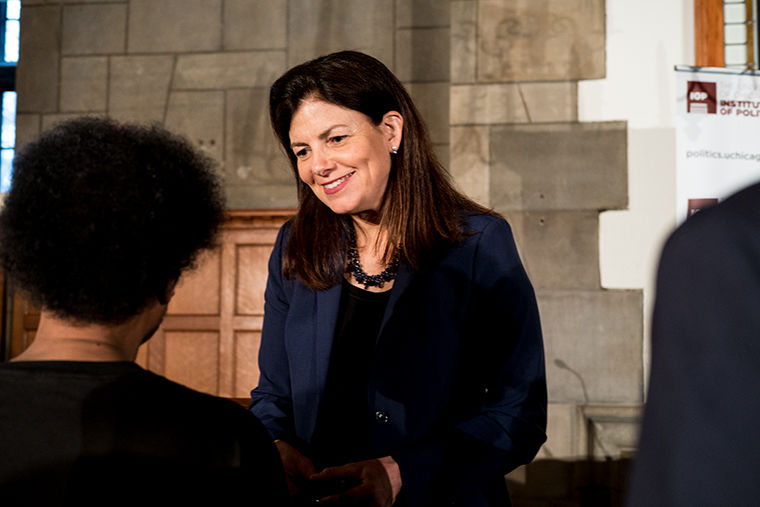Record female candidacies could make 2018 the ‘Year of the Woman’
May 7, 2018
The 2018 midterm elections have been dubbed as the “Year of the Woman,” reflecting the surge of women running for public offices nationwide. Nearly 60 percent more women declared their intention to run for the U.S. House and Senate this year compared to the 2016 election.
To interpret this political shift, the University of Chicago’s Institute of Politics hosted a May 2 panel with experts titled “Pink Wave: Surge of Female Candidates in 2018,” moderated by Amy Walter, national editor of the Cook Political Report. Panelists included Kelly Ayotte, a former U.S. senator, R-New Hampshire; Jennifer Lawless, director of the Women & Politics Institute at American University’s School of Public Affairs; and Lauren Underwood, who is the Democratic candidate for Illinois 14th congressional district.
Although women do not necessarily vote differently than their male counterparts within their own political parties, women put a higher value in congressional “school spirit” or collegiality than men, Lawless said.
“It turns out that whether you have a ‘D’ or an ‘R’ in front of your name is way more predictive of how you are going to legislate than the presence of Y chromosome in your DNA,” Lawless said.
Women are more likely to participate in the congressional softball game or secret Santa exchange, for example, she added.
“It doesn’t mean those relationships will translate into bipartisan cooperation on bills, but maybe Congress would be even more dysfunctional if we didn’t have women to keep things running in a civil way,” Lawless said.
Women currently make up only about a fifth of Congress, despite constituting half of the nation’s population. Six states have a woman serving as governor this year and 22 states have never had a female chief executive.
Just three of the 18 Illinois representatives in the U.S. House of Representatives are women. One of the two current Illinois state senators is Tammy Duckworth, who is one of only two women to have ever been elected to the U.S. Senate from Illinois.
Female candidates are judged in ways that men are not. While running for U.S. Senate, Ayotte said she was criticized for being a mother with young children.
“Do you ever hear a discussion over what kind of tie our male candidates are wearing?” she asked. “But we often judge a woman’s looks or what she’s wearing.”
Hadiya Afzal, an 18-year-old candidate running for a DuPage County Board position, asked the experts how to maintain strength as a female candidate without feeling “imposter syndrome” in the role.
Afzal said there are currently no people of color on the DuPage County Board, despite the district’s large immigrant and refugee populations.
“Women are more likely to bring light to issues that affect women and families,” Afzal said after the event. “At the local level, these resources count. [Women of color have] family backgrounds [that] are different, and that reflects in the integrity they bring to [public policy changes].”
Women often feel underqualified to pursue elected office, Ayotte said, and need to be encouraged to run.
“My male colleagues look in the mirror and saw a U.S. senator, but when I looked in the mirror, I didn’t initially see a U.S. senator,” Ayotte said.
But when women are recruited to run for office, they are receptive, just as likely as men to raise campaign money and also to win their races, Lawless said.
There is no perfect time to run for an office, but Walter noted that the Trump administration’s policies convinced Underwood to run despite not having a political background. Underwood saw the effects of those policies firsthand, while working as a nurse in disaster relief during Flint, Michigan’s water crisis, she said.
“When the Trump team made it clear that they did not want to remain in Flint [or] continue progress we had made on the ACA, I knew I couldn’t stay in government and help them take away coverage,” Underwood said.
While it seems like the trend of more women in politics is on the upswing, Lawless said she worries the “Year of the Woman” puts too much pressure on women to fix the political system.
“If we think we expect women to come to Washington and clean up a mess and pass legislation and heighten productivity—in a political institution whose rules and norms make it difficult for people to do that—we might be holding women to a standard that our institution could never allow them to meet,” Lawless said.








